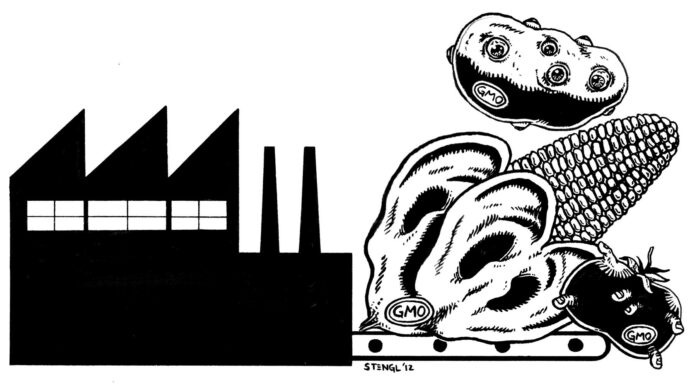Over the last several years, awareness of genetically modified organisms, or GMOs, has spread, as has the call for required labeling on food that’s been genetically modified. On the November ballot, California’s Proposition 37, if passed, would do just that.
Called the Right to Know Genetically Engineered Food Act, it’s already gathering widespread support. The Right to Know campaign in California reports that it took roughly 10 weeks to obtain close to 1 million signatures in its petition to place the requirement of labeling for GMO foods.
“In Sonoma County, we had 200 volunteers to help us collect signatures,” says Karen Hudson, one of the Sonoma County co-coordinators for Right to Know. “We’re a completely grassroots volunteer movement. People are really passionate about this. In Sonoma County, we collected about 35,000 signatures when we were just expecting 10,000.”
According to a national poll conducted by Just Label It, 92 percent of Americans want the FDA to label genetically engineered food. Another study by IBOPE (formerly Zogby International) reports support at 87 percent.
But what might seem like a simple issue—who of us doesn’t want to know what’s in our food?—has opposition in the form of a group calling itself Stop the Costly Food Labeling Proposition, which says the labeling proposal is extreme and would put “California farmers and food companies at a competitive disadvantage,” because these labels would not be required outside of California.
The opposition also criticizes Proposition 37 for having “arbitrary exemptions” to its labeling requirements. Under the proposition, foods for immediate consumption—restaurant foods and alcoholic beverages—and meat from animals fed GE products do not have to be labeled as genetically engineered. Additionally, the site states that labeling would “increase food costs paid by California consumers.”
These types of arguments might sound familiar in Sonoma County.
In 2004, Sonoma County voted down Measure M, a 10-year moratorium on growing genetically engineered crops in the county. Although Measure M was considerably stricter than the current debate on GMO labeling, Dave Henson, cofounder of the GE Free Sonoma movement, reports that the public had seemed overwhelmingly supportive. So why didn’t the measure pass at the ballot box?
Henson believes this was mostly due to lobbying efforts against the measure from biotech and big agricultural industries, adding that over a half million dollars was spent lobbying against the measure.
[page]
This year, Henson predicts, “[the opposition] will say the labeling will drive up prices, scare jobs out of California and create other concerns related to our tough economic times. It’ll be the biotech companies for sure, and they’ll be hiding behind [people who] will look like citizens. But the folks in Right to Know have been doing a great job getting the word out about what the initiative really does.”
“In this day and age, two issues are helping people decide what to eat,” explains Paul Wallace, manager of Baker Creek Heirloom Seeds at the Petaluma Seed Bank. “The first is a tough economy. People become more conscious about their dollar and what they spend on food. Families are growing more of their own foods like lettuce or cauliflower, finding it more economical. The second is because people are becoming more conscious about what they’re ingesting. In the youth right now, the instance of diabetes and other health problems has never been higher, and people are wondering why. They’re reading the food labels, and they’re determining what is best to feed their families.”
The Petaluma Seed Bank, which prides itself for carrying non-GMO seeds, is one of several local businesses supporting the Right to Know campaign. The Seed Bank, together with Baker Creek Seeds, puts on the National Heirloom Exposition, a three-day event in September featuring educational speakers, classes and events in order to help people understand the issue.
Currently, 27 nations, including Japan, Australia, Brazil, Russia, China and many in the European Union, mandate the labeling of GMOs. What were the results of labeling elsewhere?
“If 5 percent of consumers stopped purchasing genetically modified foods, stores would stop carrying those foods,” states Hudson. “That was the tipping point in Europe.” A key difference, she suggests, is that manufacturers could switch from using high fructose corn syrup, a GE product, to cane sugar.
In a research paper analyzing the effects of mandatory labeling in other countries, Colin Carter and Guillaume Gruère of UC Davis make a case that, as opposed to resulting in simple consumer choice, retailers have eliminated GE products from their shelves due to perceived consumer aversion to them.
As for the threat of increased costs to the consumer, Hudson says the labeling might cost approximately 3 cents per person each year.
“This is nothing,” Hudson argues. “Three cents compared to knowing what you’re feeding your family. That’s priceless.”











